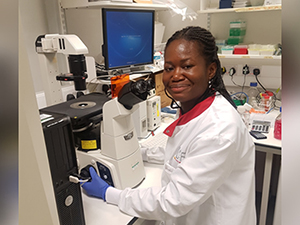Talk us through your typical day
I spend most of my day in the lab, though I do have some office responsibilities. I often start my day off with checking emails and ensuring that my day is planned well. I then check my cells under the microscope to make sure that they are growing nicely.

I'm currently growing neuroblastoma cell lines. Some cells grow fast and some grow slow! I then usually get started with experiments that I need to perform, such as Western blotting or PCR.
I generally like to do tissue culture in the early or late afternoon. Finally, I like to finish off my day ensuring that my lab area is clean.
How does your work contribute to our mission?
Life-saving treatments for cancer patients start at the lab bench. My role in conducting experiments such as Western blots to detect whether there are changes in protein expression leads to effective drugs being developed for patient benefit.
My focus in neuroblastoma research is beneficial to making the changes to defeat childhood cancer.
What big projects are you working on?
At the moment, I am working on a project focused on creating neuroblastoma cells that are resistant to a kinase inhibiting drug. Producing these resistant cell lines will enable us to investigate the molecular mechanisms behind drug resistance during cancer treatment. Understanding these mechanisms may then highlight potential therapeutic targets to combat resistance.
I am also involved in a project targeting a neuroblastoma oncoprotein named MYCN. My team and I have successfully knocked down MYCN in cell lines using shRNA – or small hairpin RNA – an artificial RNA molecule with a tight hairpin turn that can be used to silence target gene expression.
We are currently in the process of characterising these knocked-down cell lines and are beginning to notice some favourable changes in the cell's morphology and growth rate.
What are you most proud of?
Presenting a poster and giving a 60-second talk of my work at the 2019 ICR cConference!
Can you give us any examples of where you see the ICR's values in your work?
The ICR value that I feel correlates to my work the most is Pursuing Excellence. My daily aim is to work to the best of my ability to achieve goals that will ultimately help patients.
For example, my role in investigating and manipulating the MYCN oncoprotein in-vitro will lead to effective drug development and patient benefit.
Who do you collaborate with at the ICR and elsewhere?
Within the ICR, I have collaborated with the Mass Spectrometry team to gain results and analysis for some of our samples. Our group as a whole collaborates widely, from as close as our partner hospital The Royal Marsden to as far away as groups in the United States.
What makes you want to work for the ICR?
The enthusiasm that I see in the faces of fellow ICR employees and ICR students motivates me daily.
The ICR slogan: ‘Making the discoveries that defeat cancer’ inspires me to continue the life-changing work that I am doing.
What's your favourite part of your job?
My favourite part of my job is passaging cells. Though it is a relatively routine laboratory procedure, I often find it very therapeutic. It feels nice to give my cell lines some tender loving care.